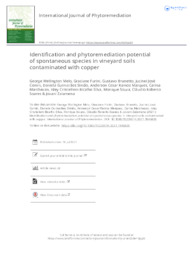Identification and phytoremediation potential of spontaneous species in vineyard soils contaminated with copper.
Identification and phytoremediation potential of spontaneous species in vineyard soils contaminated with copper.
Author(s): MELO, G. W. B. de; FURINI, G.; BRUNETTO, G>; COMIN, J. J.; SIMÃO, D. G.; MARQUES, A. C. R.; MARCHEZAN, C.; SILVA, I. C. B.; SOUZA, M.; SOARES, C. R.; ZALAMENA, J.
Summary: Copper (Cu) contents in vineyard soils due to the application of cupric fungicides cause changes in the native covering flora. Under these conditions, the surviving individuals accumulate the metal in and decrease its availability in the soil, reducing the potential toxicity to grapevine. We have identified spontaneous plant species and their phytoremediation potential from vineyards of Isabella (Vitis labrusca) on two distinct soil types (Inceptisol and Entisol) contaminated with Cu. The results demonstrated that wild species displayed higher Cu contents in the roots than in the shoot, but had low bioaccumulation potential. During summer, the plants were unable to extract and stabilize the metal, although during the winter, Lolium multiflorum, Cyperus compressus and Chrysanthemum leucanthemum demonstrated phytostabilization potential. Among the investigated species, dry matter production and Cu accumulation by Lolium multiflorum indicated that the species is effective to decrease Cu availability in the soil.
Publication year: 2021
Types of publication: Journal article
Unit: Embrapa Grape & Wine
Keywords: Copper, Cover crop, Heavy metal, Mitigation, Vitis sp
Observation
Some of Embrapa's publications are published as ePub files. To read them, use or download one of the following free software options to your computer or mobile device. Android: Google Play Books; IOS: iBooks; Windows and Linux: Calibre.
Access other publications
Access the Agricultural Research Database (BDPA) to consult Embrapa's full library collection and records.
Visit Embrapa Bookstore to purchase books and other publications sold by Embrapa.

